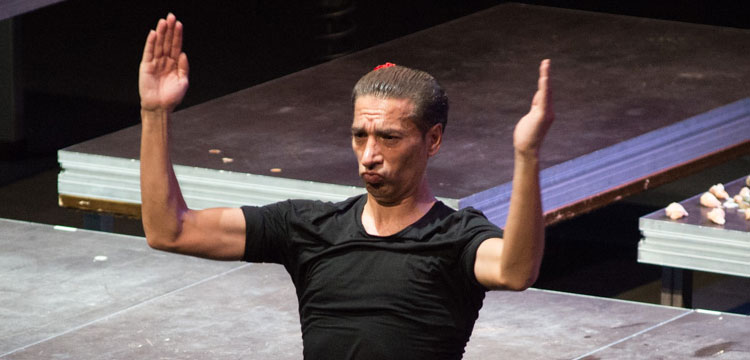La fiesta. Idea, artistic direction, choreography: Israel Galván. Aparato: Pedro G. Romero. Lighting: Carlos Marquerie. Music co-director: Niño de Elche. Collaboration in staging: Patricia Caballero and Carlos Marquerie. Performers: Israel Galván, Bobote, Eloísa Cantón, Emilio Caracafé, Ramón Martínez, Niño de Elche, Alejandro Rojas-Marcos, Alia Sellami, Uchi. Sound: Pedro León. Friday, May 18th, 2018. Teatro Central. Attendance: Full.
Text: Sara Arguijo
Photos: Adam Newby
In Israel Galván‘s La Fiesta it was all there: spontaneity, the annoying fellow, the one with no personality, the bored child, the clueless foreigner, the one who presumes to be a star, the one who goes too far, the one who plays hard to get, the one who ends up on the floor… All of them, and in every emotional state: from euphoria to reluctance, mayhem, fatigue, catharsis, ridicule, sadness and the urge to vomit. All the questions as well: why on earth did I come here, who invited this guy, how did I get sucked in and now how do I get out? In fact, rounding out the folly of what is, or ought to be a celebration of this magnitude, we were only missing the customary bit of conflict and some forbidden substance or other.
In this sense, the dancer’s last show that debuted on Friday in Seville amidst an atmosphere of maximum expectation and plenty of posturing, had the advantage of what are probably the most difficult things to find in any current stage show: a good starting point, an interesting concept, a fabulous group of interpreters and a genius.
Despite earlier reviews of the show – which, by the way, few had wanted to read or believe before entering the theater – the audience was predisposed to give the benefit of the doubt and let it be known that here, in his own hometown, we’re capable of understanding him better than anyone. Which is a ridiculous point, like so many others, that ends up falling apart in the most basic elements such as pacing, cohesion and a harmonious flow.
Because it is indeed true that Galván shares a language and landscape common to his closest audience. Which is why the parody was perfectly understood. The group of clown-characters who in this show break with the humor and optimism of Fla.co.men to expose his most decadent and pathetic facet. Like those clowns from the World Circus your father took you to see at the fair as a special treat, but who provoked more sadness than humor.
Maybe it’s like the interchanging roles and distortions that like a mirror maze do not always show us the image we want to see of ourselves. And the bleating of goats and sheep, voices that don’t come out, songs that are stuttered and stop-started and effects with which Niño de Elche, superb in his stage presence and that of the rest of the artists, generated an enthusiastic and fatiguing atmosphere. We even took the Betis team’s tracksuit and other soccer garb to be the memory of the child Israel was (or wanted to be). Certainly out of place in those events from the San José Obrero neighborhood or the get-togethers he knew as a child.
Summing up, the best thing about La Fiesta is the clever game of it all. The ingenious language the artist employs to lay out his thoughts. But not even that is enough to prop up a show which, at best, is irregular, long and flawed. It’s hard to understand for example that greater use is not made of the talent on stage. There’s no excuse for the excess of pantomime or the repetition of certain ploys. It’s incomprehensible that Israel dances so little, and when he does, it’s a soliloquy of more than 25 minutes, distanced from the group concept and the script itself, a number we could have seen in any other context. And, above all, it’s unpardonable that a show begins getting you up from your seat with a knock-down-drag-out beginning, and ends getting you slumped in your seat bored to tears. Although an English poet once said “every fiesta is the madness of many for the satisfaction of a few”. At least the good thing in this case is there wasn’t any hangover.
